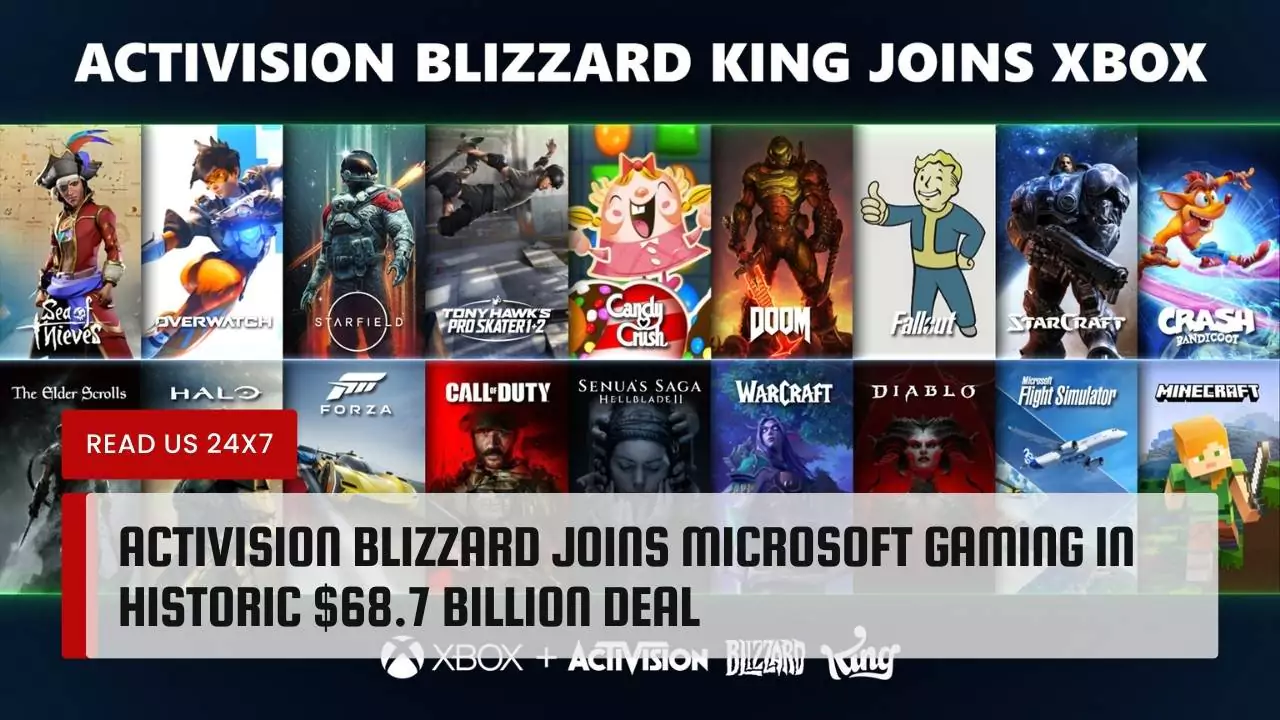Microsoft has completed its acquisition of Activision Blizzard, the gaming giant behind popular franchises such as Call of Duty, World of Warcraft, and Overwatch, for a whopping $68.7 billion. The deal, which was first announced in January 2022 and completed on October 13, 2023, is the largest in Microsoft’s history and one of the biggest in the tech industry.
Background of Microsoft and Activision Blizzard
Microsoft is a dominant player in computing software, and also makes the Xbox line of game consoles and operates Xbox Game Studios, a collection of developers to create first-party titles. Microsoft has been investing heavily in gaming as a strategic business segment, aiming to bring the joy and community of gaming to everyone, across every device.
In 2021, Activision Blizzard’s yearly sales were at $8.8 billion, making them one of the biggest video game producers globally. The company is composed of five business units: Activision Publishing, Blizzard Entertainment, King, Major League Gaming, and Activision Blizzard Studios. Among its assets are ownership of Call of Duty, Crash Bandicoot, and Spyro from Activision’s studios; Warcraft, Diablo, StarCraft, and Overwatch from Blizzard Entertainment; and Candy Crush Saga from King.
Details of the Acquisition
Announcement
On January 18, 2022, Microsoft announced its intent to acquire Activision Blizzard for $68.7 billion in an all-cash deal1, or approximately $95 per share. Activision Blizzard’s stock price jumped nearly 40% that day in pre-market trading. The deal would make Microsoft the third-largest gaming company by revenue, behind Tencent and Sony.
Regulatory Response
The proposed acquisition encompasses renowned properties from the Activision, Blizzard, and King studios, such as “Warcraft,” “Diablo,” “Overwatch,” “Call of Duty,” and “Candy Crush,” as well as worldwide eSports endeavors through Major League Gaming. The corporation operates studios globally, employing close to 10,000 individuals.
The acquisition faced regulatory scrutiny from several national anti-trust bodies around the world. The European Commission approved the deal on February 16, 2022, while China’s State Administration for Market Regulation (SAMR) granted early approval on March 15. However, some regulators expressed concerns about the potential impact on competition and consumer choice in some markets.
The United States Federal Trade Commission (FTC) issued a formal challenge to the acquisition on March 18, arguing that it would harm competition and innovation in online gaming platforms. The FTC also requested that Microsoft divest some of its cloud gaming assets or services related to Activision Blizzard’s games for ten years.
The UK’s Competition and Markets Authority (CMA) also launched an investigation into the deal on March 19, following similar concerns raised by other regulators. The CMA said it would assess whether the deal would result in a substantial lessening or prevention of competition within any market or markets in the UK.
Legal Challenges
The acquisition also faced legal challenges from some shareholders who sued Activision Blizzard for breach of fiduciary duty over its handling of sexual harassment allegations against former CEO Bobby Kotick. Kotick stepped down as CEO on January 18 amid mounting pressure from investors and employees over his role in fostering a toxic work culture at Activision Blizzard.
Some shareholders claimed that Kotick had failed to disclose material information about his involvement with lawsuits against former employees who accused him of sexual misconduct or discrimination. They also alleged that Kotick had used his influence to pressure employees to sign non-disclosure agreements or refrain from speaking out about their experiences at Activision Blizzard.
The lawsuit was filed by Elliott Management Corporation on behalf of other institutional investors who owned shares representing more than 10% of Activision Blizzard’s outstanding stock at any time during a three-year period ending on December 31, 2020. They sought damages for alleged violations of federal securities laws by Kotick and other directors.
Impact on the Gaming Industry
Microsoft’s Expanded Portfolio
With this acquisition, Microsoft gained access to some of the most popular and profitable games in history. Call of Duty alone generated $6 billion in revenue for Activision Blizzard in fiscal year 2021, making it one of its main sources of income. Other franchises such as Warcraft, Diablo, StarCraft, and Overwatch also have loyal fan bases across multiple platforms and genres.
Microsoft plans to leverage its technology, distribution, access to talent, ambitious vision, and shared commitment to gaming and inclusion to create new experiences and opportunities for players and creators. Microsoft will also continue to support existing games and services from both companies, as well as collaborate with them on cross-platform initiatives and esports events.
Future Plans of Activision Blizzard
Activision Blizzard will continue to operate as an independent company within Microsoft, with its own leadership team and culture. The company will also retain its creative autonomy and flexibility to develop and publish games across multiple platforms and genres. Activision Blizzard will also benefit from Microsoft’s resources, technology, distribution, and cloud capabilities to enhance its games and services.
Some of the future plans of Activision Blizzard include:
- Hiring more than 2000 developers by the end of 2023, tripling the size of certain franchise teams compared to those team sizes in 2019.
- Expanding its presence in new studios or major expansions in Poland, China, Australia, and Canada.
- Supporting existing games and services from both companies, as well as collaborating with them on cross-platform initiatives and esports events.
- Investing in world-class content, community, and the cloud to usher in a new era of gaming that puts players and creators first and makes gaming safe, inclusive, and accessible to all.


